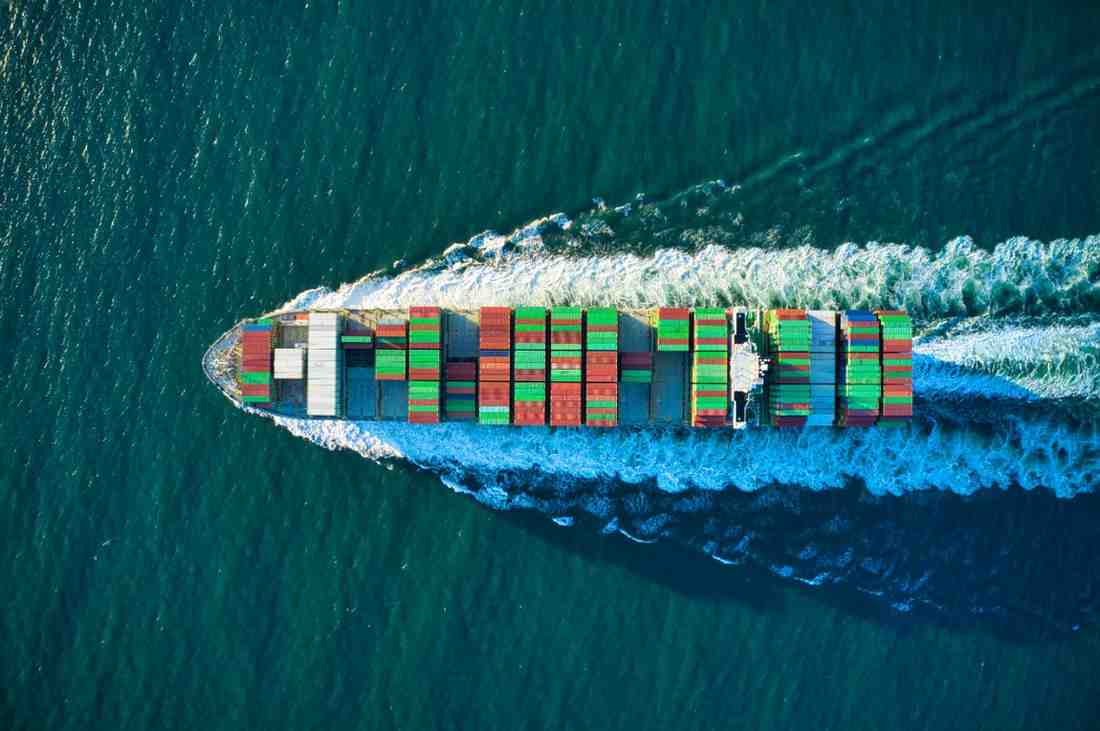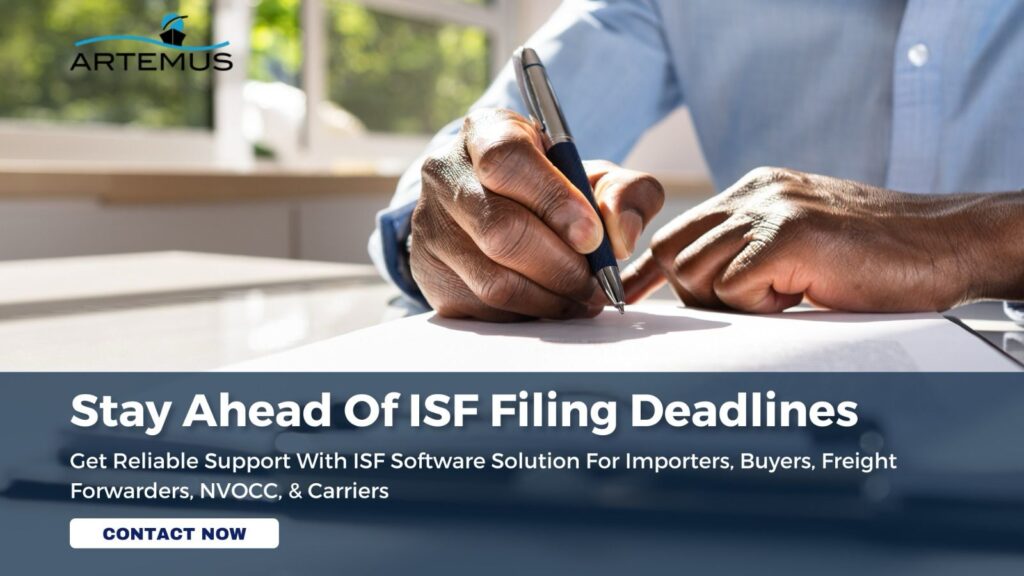
What Is Inbound Logistics & Outbound Logistics? A 2025 Guide
In the dynamic world of supply chain management, understanding the nuances of inbound and outbound logistics is crucial for operational

Commencing on the intricacies of global shipping, Non-Vessel Operating Common Carriers (NVOCCs) emerge as key facilitators between shippers and carriers. In this exploration, we delve into What Is NVOCCs their functions, and the impact of NVOCCs on modern supply chains.
Additionally, we spotlight Artemus Transportation Solutions‘ ISF Software Solution tailored for NYOCCs, streamlining Importer Security Filing processes and enhancing operational efficiency in compliance with international trade regulations. Join us in unraveling the vital role of NVOCCs and the technological advancements shaping their capabilities in the dynamic world of logistics.
Table Of Contents
NVOCC, or Non-Vessel Operating Common Carrier, refers to a crucial entity in the shipping and logistics industry. Unlike traditional carriers that own vessels, NVOCCs consolidate and manage shipments from various customers, utilizing the space on multiple carriers for cost-effective and efficient transportation.
Acting as intermediaries between shippers and carriers, NVOCCs handle documentation, booking, and coordination of cargo, providing a streamlined and comprehensive solution for businesses involved in international trade.
With expertise in navigating complex logistics networks, NVOCCs play a pivotal role in ensuring the smooth movement of goods across global shipping routes.
Related: How To Find HTS Code? Tips For HTS Code Identification
Navigating the intricate landscape of global trade requires strategic intermediaries and Non-Vessel Operating Common Carriers (NVOCCs) play a pivotal role in streamlining international shipping. Here’s a closer look at the key functions of NVOCCs:
NVOCCs excel in consolidating shipments from multiple customers into cohesive, cost-effective container loads. This practice optimizes container space, ultimately reducing shipping costs for individual shippers.
Acting as liaisons between shippers and carriers, NVOCCs manage the intricate booking process, securing space on vessels, and handling extensive documentation. This includes bills of lading, customs paperwork, and other essential documents, ensuring compliance with international shipping regulations.
In the complex web of global shipping, NVOCCs coordinate with various shipping lines. This allows them to secure space on different vessels, offering shippers flexibility and diverse options to meet their specific shipping needs.
Leveraging advanced tracking systems, NVOCCs provide real-time information on the movement of containers. This transparency ensures that shippers are well-informed about the status and location of their cargo throughout the shipping process.
NVOCCs play a crucial role in mitigating risks associated with international shipping. They navigate complex regulations, handle customs documentation with precision, and address potential issues that may arise during transportation, providing a buffer against unforeseen challenges.
Armed with industry expertise and relationships, NVOCCs negotiate competitive freight rates with carriers on behalf of shippers. This not only secures cost-effective transportation but also allows shippers to benefit from the NVOCC’s bargaining power.
Accuracy and compliance are paramount in international shipping. NVOCCs ensure that all shipping documentation, including bills of lading and customs paperwork, meets the stringent requirements of international trade regulations.
Going beyond port operations, NVOCCs offer end-to-end logistics solutions. This involves managing the entire transportation process, from the shipper’s location to the final destination, incorporating various modes of transportation seamlessly.
Efficient container management is a hallmark of NVOCCs. They optimize container logistics by overseeing loading and unloading, ensuring proper maintenance, and maximizing container utilization for the most cost-effective shipping solutions.
With a commitment to customer satisfaction, NVOCCs provide personalized service. They address inquiries promptly, offer shipping updates, and guide shippers through the complexities of international trade, fostering strong and enduring relationships with their clients.
Related: HS Code VS HTS Code: 10 Differences You Need To Know
In the dynamic landscape of global trade, Non-Vessel Operating Common Carriers (NVOCCs) play a crucial role in enhancing the efficiency of international shipping. Here are five key advantages businesses can gain by utilizing NVOCC services:
NVOCCs leverage their expertise to negotiate competitive freight rates with carriers, allowing businesses to benefit from cost-effective shipping solutions. By consolidating shipments and optimizing container space, NVOCCs contribute to overall cost savings in the logistics chain.
NVOCCs offer shippers a range of flexible and diverse shipping options by coordinating with various shipping lines. This flexibility allows businesses to choose the most suitable routes and schedules that align with their specific shipping needs, contributing to a more tailored and efficient logistics strategy.
NVOCCs play a crucial role in navigating the complexities of international shipping regulations, customs procedures, and potential risks. Their expertise helps mitigate risks associated with documentation errors, compliance issues, and unexpected challenges during transportation, ensuring a smoother and more secure shipping process.
Handling extensive documentation is a significant aspect of international trade, and NVOCCs excel in streamlining this process. By managing bills of lading, customs paperwork, and other documentation with precision, NVOCCs save shippers valuable time and reduce the likelihood of errors or delays.
Beyond traditional shipping services, NVOCCs provide end-to-end logistics solutions. This includes efficient container management, door-to-door transportation, and advanced tracking systems, offering businesses a one-stop shop for their shipping and logistical needs. This comprehensive approach enhances overall efficiency and convenience for shippers.
Related: Customs Compliance Software: Key Benefits & Top Suggestions
In the complex world of international shipping, Non-Vessel Operating Common Carriers (NVOCCs) must adhere to stringent regulations to ensure smooth operations. Here are five key points highlighting the international regulations governing NVOCCs:
In the United States, NVOCCs fall under the regulatory purview of the Federal Maritime Commission (FMC). Compliance involves obtaining an Ocean Transportation Intermediary (OTI) license, adhering to tariff regulations, and maintaining financial responsibility.
NVOCCs must comply with regulations related to Bill of Lading (B/L) issuance. This includes accurate documentation, transparent terms and conditions, and adherence to the Hague-Visby Rules or similar international conventions.
The IMO sets global standards for maritime safety, security, and environmental performance. NVOCCs must comply with these standards, particularly those related to container weight verification under the Safety of Life at Sea (SOLAS) Convention.
NVOCCs must navigate various customs regulations in different countries. Compliance involves accurate and timely submission of customs documentation, adherence to import and export restrictions, and compliance with customs clearance procedures.
NVOCCs must adhere to antitrust and competition laws to ensure fair business practices. This includes avoiding collusion, price-fixing, or any activities that may result in anti-competitive behavior, aligning with regulations set by authorities like the European Commission and others.
Related: Where Can I Buy A Customs Bond? Understand Your Options
Here are key differentiators between Non-Vessel Operating Common Carriers (NVOCCs) and traditional shipping methods, shedding light on the unique characteristics that can influence a company’s approach to international transportation:
Related: ISF Filing: A Compliance-Related Guide & Software Solution

Artemus’ ISF (Importer Security Filing) software for NYOCC (Non-Vessel Operating Common Carrier) optimizes the importation process by automating ISF document submission. Specifically designed for NYOCCs, this solution ensures swift and accurate compliance with U.S. Customs and Border Protection regulations. With user-friendly features, Artemus’ ISF software streamlines the information exchange, minimizing errors and simplifying the complexities of import security filings for enhanced efficiency.
Related: ISF 5: Meaning, Compliance Requirements, & Best Practices
The role of NVOCC (Non-Vessel Operating Common Carrier) in exports is to consolidate and manage shipments from various exporters, negotiate competitive freight rates, and coordinate the transportation of goods on behalf of shippers using the space on ocean carriers.
The advantage of NVOCC (Non-Vessel Operating Common Carrier) is its ability to provide cost-effective and flexible shipping solutions by consolidating shipments, negotiating competitive freight rates, and offering a range of shipping options to exporters and importers.
NVOCCs (Non-Vessel Operating Common Carriers) are private companies or individuals that operate as intermediaries in the shipping industry, consolidating and managing shipments without owning vessels.

In summary, Non-Vessel Operating Common Carriers (NVOCCs) stand as pivotal players in modern international shipping. Their role as intermediaries streamlines trade by consolidating shipments, negotiating competitive rates, and managing documentation. Offering cost-effective solutions and flexible options, NVOCCs empower businesses to navigate global commerce with enhanced efficiency. As key facilitators in the ever-evolving supply chain, NVOCCs play a crucial role in shaping the future of seamless and agile global trade.
Related: Customs Broker Exam Registration: In-Person & Remote CBLE

In the dynamic world of supply chain management, understanding the nuances of inbound and outbound logistics is crucial for operational

In today’s interconnected world, businesses rely heavily on global trade to expand their markets, access new resources, and drive growth.

Importing goods for resale in the USA presents a lucrative business opportunity, but navigating the complexities of U.S. customs regulations,
Get In Touch
Artemus’ Software Solutions for ISF, AMS, Japan AFR, eManifest Canada, & Panama B2B filings.